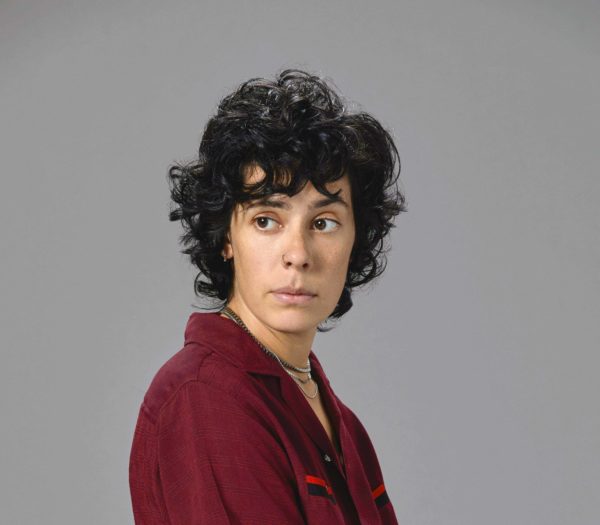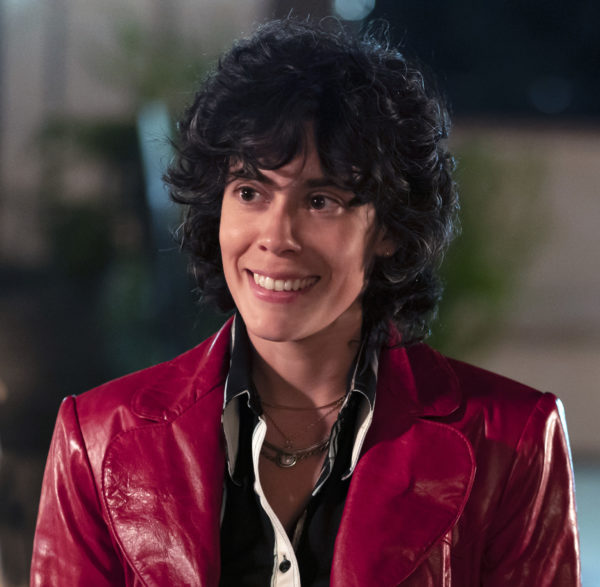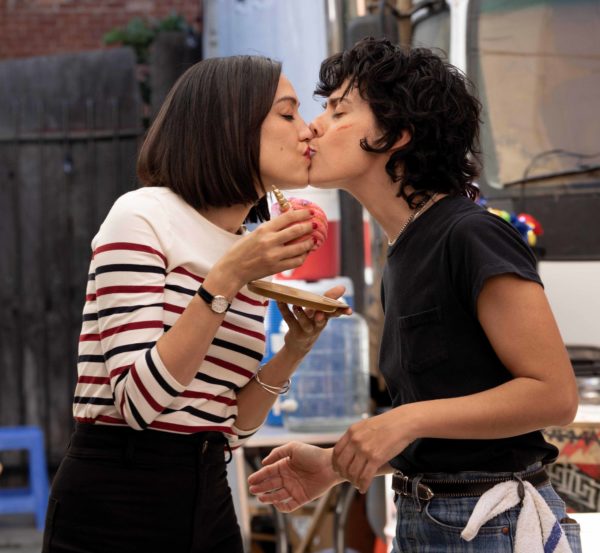I had been impressed by Roberta Colindrez when she played Devon in I Love Dick (2017), the Amazon series created by Jill Soloway from the novel by Chris Kraus, and it was exciting to watch her play Nico in seasons two of Vida, the Latinx series set in Boyle Heights, now returning for season three. I was pleasantly surprised to see her pop up as Jules in Mrs. America (2020), a miniseries about the fight against the ratification of ERA (Equal Rights Amendment) in the 1970s. All three characters are proudly and confidently queer, as the actress who created them.

Born on May 18, 1986 in Monterrey, Mexico, to an an Argentine mother and a Honduran father, Roberta was raised in Austin Texas, moved to New York, where she landed the pivotal role of Joan in the musical Fun Home (2013-2015) based on the graphic memoir of cartoonist Alison Bechdel. We will see her next in the movie Ms. While Light with Judith Light and in the series A League of Their Own, based on the 1992 movie directed by Penny Marshall.
I was anxious to talk to this young woman, who represents for me the best of the millennial generation, that we hope will carry forward the cultural revolution we had started in the late 60s as feminist baby boomers. She kindly spoke with me, virtually, from her apartment in New York City.

I find Nico a very positive character, just like Eddy, Vida’s widowed wife played by Ser Anzoategui. What conversations did you have with series creator Tanya Saracho about the wide spectrum of sexual preferences and gender expressions presented in Vida, which will help people understand how everybody is different but equally human?
When Tanya called me about Nico, one of my concerns was that I had been playing a lot of gay characters on the screen and sometimes it felt like I was servicing the need to fill the gay quota. I told Tanya my reticence to continue doing that, and she said, “If you feel that people only watch your characters thinking of them as gay people, maybe it’s your job to make sure that you fill them with as much variety as possible, so that people understand that gay people are not all the same.” Tanya wanted to make sure that in Vida we had every kind of person that exists in our Latin community, which includes gay people, but it often gets ignored.
I wrote a couple of articles about the series Transparent, created by Jill Soloway, who now identifies as trans non-binary. There are no trans characters in Vida, but what are your thoughts on the wider acceptance of transgender people?
Maybe none of the characters in Vida are necessarily trans, Eddy is very much an old school butch lesbian, she doesn’t even use the word queer yet, but Ser the actor is absolutely gender non-conforming, uses the pronouns they/them. I think we are finally getting to a point where people don’t have to explain their sexuality all the time, and that’s a really beautiful thing, if that’s where we’re going, then we’re accomplishing something.

What does Jules, the photographer that you play in Mrs. America, bring to the consciousness of feminist Brenda Feigen, the lawyer who joined Ruth Bader Ginsburg in co-directing the ACLU’s Women’s Rights Project in 1972?
One of the things about being a gay adult is that you meet a lot of people that have a wall up around themselves, and the older you get, the less walls you have, the more visible others are. I think any time that you meet someone that can usher you towards a new direction that you didn’t know that you had to head down, that’s a really huge moment in all of our lives. We all have those people, and not all are sexual objects, but anyone that can point you in a new unimagined direction or one that you were afraid of, it’s really a beautiful thing to find.
Did you have to learn how to use a camera for the role, or were you already taking pictures before?
I do take a lot of photos, especially on set. I have a camera that my father gave me on my 30th birthday, an FTB Canon that they gave him in the Army. And I have a Canon A1 that I really love. During the Queerceañera party in Vida, I had my camera on me to take photos throughout the day, and Tanya let me use it, so you see me taking pictures in one of the scenes.

How did you create Devon, the androgynous playwright you played in I Love Dick? When I asked Jill Soloway about it, she commented, “I loved seeing Roberta explore a queer cowboy masculinity.”
With the gender presentation of Devon, I felt it was really important for me not to question it too much, because I didn’t want to put all my theory onto this person who seems so comfortable with who they were. Especially because I had read the monologue where Devon is talking about when they were a kid, not wanting to be called Dolores by their sister, and the way they worshipped Dick. Devon’s identity seems so lived in that I did not want to question it and put any of my own fears into playing a person who was gender queer, because I know that right now we are in a tricky place, where we have to be really sensitive about representation. I have my own past with my gender presentation, with the way that I internalized what gender was for me, so I wanted Devon to be free to be themselves.
Could you explain how and when did you come to terms with your queerness in your own life?
It took a long time for me to realize this, but when you are a gay kid in the closet, being fully in denial of that, I wanted to believe that girls liked boys and boys liked girls, and that was it, you had to be a boy to like a girl and a girl to like a boy. It wasn’t until I was out of the closet and fully comfortable with who I was, who I am, that I realized that, as a kid and as a teenager, I always saw myself as a boy, because I knew that I had internal feelings about women, and I had convinced myself that only boys could feel that way. It wasn’t until realized that I was gay that I was like, “No, I’m just a woman who loves a woman, and it’s totally fine, you can be like that.”

What meaning did it have for you and for your career to play Joan on Broadway in the musical Fun Home?
That was a huge role for me, obviously it was my first time on Broadway, and it happened at a time when I was already super comfortable with being gay. But being in the world that director Sam Gold created with music by Jeanine Tesori and lyrics by Lisa Kron, was a place of love and acceptance. I feel really fortunate that the first big thing that I did was something that was so full of love for people like myself. I knew every day that I got off stage, I went outside and I talked to fans, that we were doing something that was really important; having people say to me, “I’ve never seen myself on stage before,” was one of the most humbling experiences of my life. It was transformative for me, it opened so many doors in my career and it reminded me that this entertainment industry does produce labors of love and it is still true to humanity.
What lessons have you learnt from your parents’ example growing up that still helps you today?
One of the things I most admire about my parents is that, because they are both immigrants to this country, as are their children, they’ve always been really encouraging of traveling and knowing the world, of taking risks, they have done a really great job of teaching us that the world is small and life is really short, so you have to do what you have to do. My sister lives in Italy, she has lived in Copenhagen, she’s a traveller, a wanderer. My brother is in Austin, he lives really close to my parents, he’s there holding down the fort, and we all stay really close.
How do you feel about this coronavirus pandemic that not only is killing people, but is causing so many workers to lose their jobs and their healthcare, and the world economy to crash? Do you hope that something positive will come out of this crisis?
I think any opportunity that we have as a society to learn and apply lessons is a really incredible moment. And unfortunately maybe it did take something like this for us, especially those in power, to realize that it’s not the banks that are saving us, it’s the working class that kept this country afloat for so long. And if the call for universal healthcare is not as clear as day right now, I don’t know if it ever could be. It is also a really great time to volunteer, to remember, in the slowness of what our lives have become now, that we have the power to make sure that we are doing as much as we can to take care of each other. There are people who have cars that have been going out and doing food deliveries to people who cannot go food shopping. That’s a really powerful tool. If you are fortunate enough to have a savings account, then you may have a little extra change to donate to people in need, to people that are providing services. As a whole we have to reexamine what really matters and what it means for us to be part of whatever community we feel part of, so I feel like it’s a huge moment.
This crisis should not make us forget that this is an election year, and we have to remove our current President by voting for the Democratic candidate. What are your thoughts about that?
I was a pretty devout Elizabeth Warren person while she was campaigning and then, when she left, I became a devout Bernie Sanders person. I believed in the things that he thought needed to happen in this country, and I was really bummed when he dropped out. I don’t fully understand it, but here we are, now they’re both endorsing Joe Biden, and Obama is too. Biden is not my favorite candidate, I wouldn’t put him on the list of my ten favorite potential presidents, he is not anyone’s top choice, but he’s not Donald Trump, so I will do my part to make sure that he gets the vote and not the current piece of shit that happens to be in charge of this country. Maybe we need to rethink our entire process of voting, the kinds of candidates we can have and what it means to belong to any party, if we should we have a two-party system to begin with.
For more on Roberta Colindrez read my interview on the Golden Globes website.
